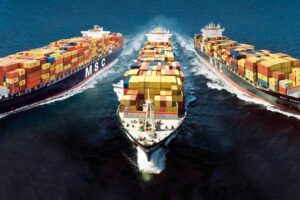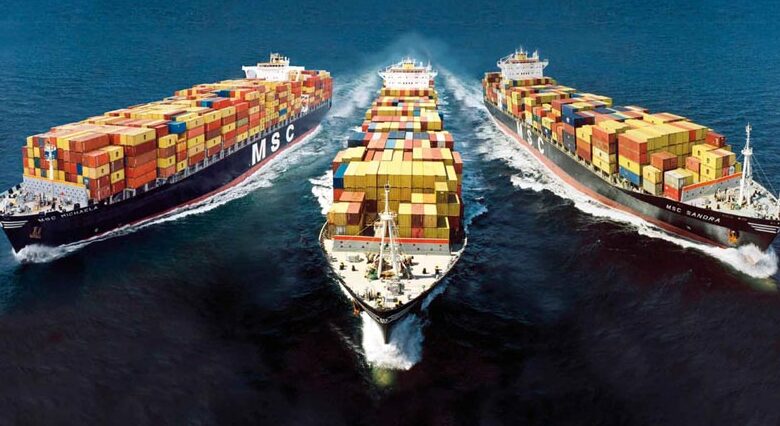Globalization, which refers to the spread of the flow of financial products, goods, technology, information, and jobs across national borders and cultures, has been a driving force in the growth of international trade. The early trade routes between different regions of the world, such as the Silk Road, were early examples of globalization. These routes enabled the exchange of goods and ideas across vast distances, leading to increased economic activity and cultural exchange.
The industrial revolution in the 18th and 19th centuries marked a significant turning point in the history of globalization and international trade. Industrialization enabled trade, communication, and business development on a scale never before seen. The trend since the 1950s has been characterized by growing flows of manufactured goods and their increasing share of international trade. The elimination or reduction of trade barriers has also been a core element of globalization, leading to the expansion of world trade.
Today, globalization continues to shape the business and social landscape. The increased size of the global market has allowed for the production and sale of more and different goods at cheaper prices. The rebound of world trade in 2021 has surpassed even the most optimistic early forecasts, demonstrating the continuing importance of globalization and international trade. As countries continue to open up to trade, local markets respond, and prices change, leading to a constantly evolving global economy.
The economic impacts of globalization and international commerce
Globalization and international commerce have had a significant impact on the global economy, resulting in increased economic growth. The growth of international trade has been extraordinary over the last couple of centuries, with exports today being more than 40 times larger than in 1913. Trade is an engine of growth that creates better jobs, reduces poverty, and increases economic opportunity. When countries open up to trade, the demand and supply of goods and services in the economy shift, leading to local market responses and changes in prices. As a result, globalization has boosted output in the Western economy and enabled firms to specialize and increase the intensity of research and development.

International commerce has also led to job creation and investment opportunities. Exports stimulate job creation, particularly in developing nations, as industries sell beyond their borders. Foreign investment can also create jobs and stimulate economic growth in countries with fewer resources. However, globalization and trade have also resulted in income inequality and labor exploitation. The rapid pace of trade and financial globalization has contributed to the rise in income inequality observed in most countries. Globalization is also contributing to increased integration of labor markets and closing the wage gap between workers in advanced and developing countries, leading to labor exploitation in some cases.
The expansion of global trade and the increasing integration of global value chains also raise questions about the interaction between trade and the environment. The interaction between trade and the environment is complex and multifaceted, with proponents of workers’ rights arguing that trading nations should be held to strict labor standards. It is important to analyze the inequality outcomes of international trade treaties, global environmental regulations, and global regulations to ensure that globalization and international commerce do not have a negative impact on the environment or on vulnerable populations.
The social impacts of globalization and international commerce
One of the most significant impacts of globalization and international commerce on society is the exchange and diversity of cultures. The integration of different cultures and ideas has led to a more diverse and interconnected world, providing individuals with the opportunity to learn from and appreciate different perspectives and ways of life. International trade has also allowed for the spread of cultural products, such as music, movies, and literature, enabling individuals to experience and appreciate different cultures. However, it is essential to recognize and understand the cultural differences that affect international business, including communication, etiquette, and organizational hierarchy, to avoid misunderstandings and conflicts.

Globalization and international commerce have also had significant environmental impacts. The expansion of global trade and the integration of global value chains have raised concerns about the interaction between trade and the environment. Globalization has contributed to deforestation, the consumption of non-renewable fossil fuels and natural resources, and an increase in greenhouse gas emissions. However, globalization can also lead to improvements in energy efficiency, resulting in the production of goods and services that generate fewer emissions. Therefore, it is crucial to consider the environmental impacts of international commerce and take measures to mitigate its negative effects.
The expansion of globalization and international commerce has also raised human rights and social justice issues. The spread of global trade has led to increased economic growth and job opportunities, but it has also resulted in labor exploitation, especially in developing countries. It is essential to incorporate human rights issues into international trade rules to ensure that economic growth and development do not come at the expense of basic human rights. Additionally, globalization has led to increased income inequality, as the benefits of economic growth are not evenly distributed. Therefore, it is crucial to address these social justice issues and strive for a more equitable distribution of the benefits of international commerce.










